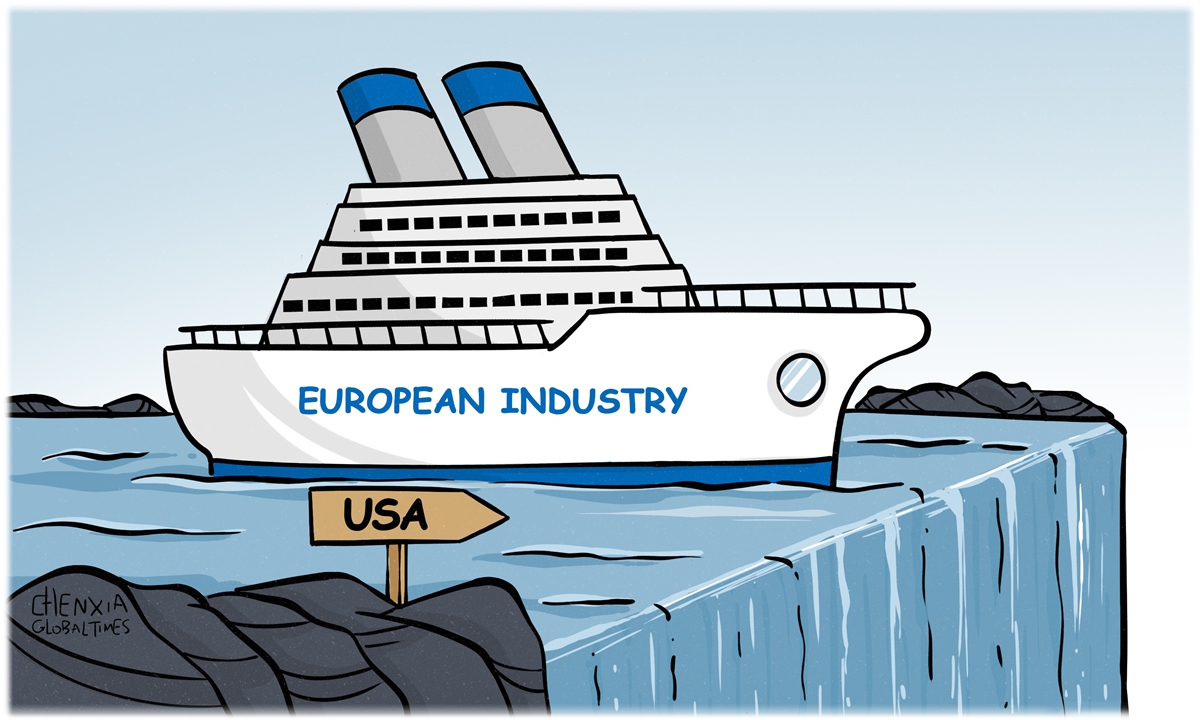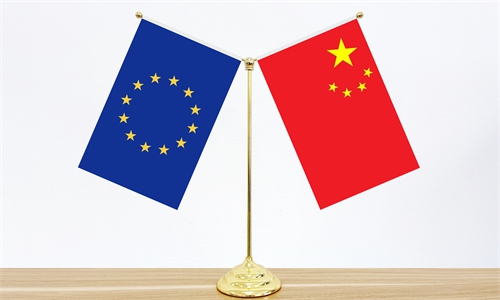
Illustration: Chen Xia/Global Times
Several Western media outlets in recent months have published articles highlighting investments into the US' manufacturing sector. The Financial Times (FT) claimed in an article on Sunday that "European industry pivots to US as Biden subsidy sends 'dangerous signal.'" The report cited the example of Swedish battery-maker Northvolt, which is looking to expand production in the US.There's some evidence that the US is starting to make a manufacturing comeback, but it remains too early to say the trend is sustainable, taking into consideration the US' incomplete industrial chain, high-cost labor, and outdated infrastructure. Still, it is a real concern that the Biden administration's economic policy may have a certain impact on the global supply chains and give US manufacturers an unfair advantage over competitors throughout the rest of the world, including in Europe.
Especially after the beginning of the Russia-Ukraine conflict, the US and European economies are getting closer than they have been in years, but the interests of European economies are being affected and eroded gradually in the process.
The FT attributes European industry's pivot to the US to its so-called Inflation Reduction Act. The legislation, signed into law in August, would subsidize a factory in the US from $600 million to $800 million, compared to 155 million euros ($158 million) of stimulus on the table from Germany, the FT report said.
Another major reason for the pivot is soaring energy prices. As a consequence of the rising cost of input fuels, benchmark electricity prices in Europe have surged almost 300 percent in 2022, Time.com reported. The US has tried to agitate anti-Russia sentiment, which resulted in a looming energy crisis in Europe, and exports high-priced energy products to Europe to make a profit. The cost of energy in Europe has blown through the roof. According to Fortune magazine, electricity is at 60 cents per kilowatt-hour, which is five to 10 times the cost of electricity in most US states.
The relocation of some manufacturing production away from Europe is not a natural process driven by market choice, but a result of direct US intervention in the global supply chain. This has caused dissatisfaction from the European side. The EU has said that it has "serious concerns" about the US Inflation Reduction Act, saying it breaches international trade rules, according to an official document cited by CNBC.
US-EU relations are complicated as they are both large economies. But Europe should understand what its major challenge is. A healthy manufacturing sector is crucial for economic growth. European industry needs to ramp up or at least maintain its manufacturing capacity and sustain technological leadership in key areas.
However, it would be difficult for the EU to retaliate in a tit-for-tat fashion against Washington's selfish policies, although it is also not a good idea to turn a blind eye to the shift of some production from Europe to the US. A realistic choice for Europe is to improve the core competitiveness of its manufacturing industry through broad international cooperation.
In recent years, the US and the EU have witnessed an increase in the injection of so-called national security concerns into economic and trade policy, which set up obstacles for foreign companies hoping to invest in some key manufacturing sectors that are in urgent need of investment. However, the path of self-isolation will weaken the competitiveness of the manufacturing industries, affect EU employment and put its economy at a disadvantage in competition with the US.
The EU and its member states need to take action to minimize the fallout on the economy of the US Inflation Reduction Act and soaring energy prices. The first step now is to further open its economy to foreign investors and improve its manufacturing competitiveness fundamentally.
The author is a reporter with the Global Times. bizopinion@globaltimes.com.cn



